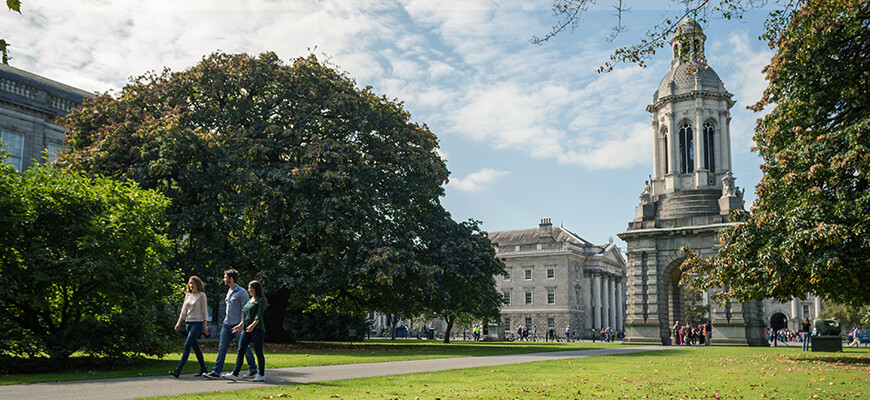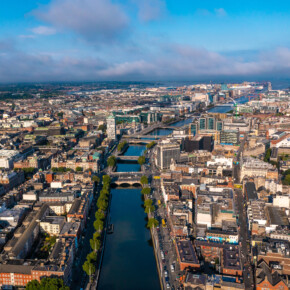Trinity agrees to Israeli divestment after student protest
Mike Finnerty 15 May 2024
A five-day encampment by Trinity College students came to an end after the college agreed to cut ties with Israeli companies.
Over the bank holiday weekend, students set up an encampment on the grounds of the college in protest of the student union being hit with a fine over lost revenue.
The college hit the student union with a €214,000 fine over protests held by students over the ongoing conflict between Israel and Palestine, as well as hikes to accommodation costs and student fees.
Trinity asserted that the protests translated to lost revenue for the college, which caused an escalation in events.
On the Friday of the May bank holiday weekend, and drawing inspiration from similar protests in the United States, Trinity students barricaded themselves into the building and called for Trinity to cut their ties with Israeli-linked companies.
An encampment was set up which blocked public access to the college campus over the bank holiday weekend.
The BBC reported that Trinity lost €350,000 in revenue from tourists being unable to access the Book of Kells, leading Trinity to swiftly reach an agreement with the students over the blockade and announcing a cutting of ties between the college and Israeli-backed firms.
Trinity said “we abhor and condemn all violence and war, including the atrocities of October 7th, the taking of hostages and the continuing ferocious and disproportionate onslaught in Gaza. The humanitarian crisis in Gaza and the dehumanisation of its people is obscene.”
The statement added that “Trinity will complete a divestment from investments in Israeli companies that have activities in the Occupied Palestinian Territory and appear on the UN blacklist” and “will endeavour to divest from investments in other Israeli companies.”
As a result of the movement, Trinity said they would give places to six postgraduate and two undergraduate scholars from Gaza.
The college said that fees will be waived for these scholars and Trinity will use a sanctuary fund to provide accommodation to the students.
The college disclosed that an Israeli company will remain on the list of suppliers until March 2025 for “contractual reasons.”
Senior Dean Prof. Eoin O Sullivan, who led the talks for Trinity, said “we are glad that this agreement has been reached and are committed to further constructive engagement on the issues raised.”
A new task force with student and staff representatives will review Trinity’s student exchanges would also be set up in the aftermath of the protest.
Trinity Student Union president László Molnarfi said the student union had “no intention” of paying the original fine placed on them.
Molnárfi became the figurehead for the protests and said the recent campus protests in the United States were an inspiration to Trinity students.
He said the protests “prove the power of student and staff protest for Palestine, and this should raise the confidence for other students to push for apartheid-free campuses”
He said the victory was “partial,” but hoped it would represent a change in Ireland’s direction regarding Palestine.
“It is important not to lose sight of what has driven this protest, the ongoing genocide in Gaza and the 75-year-long occupation of Palestine. We are responding to a global call made from Palestine, and it is important that people all around the world do the same thing,” he said on Twitter.
The Trinity protest received the backing of elected representatives.
Sinn Féin TD and party higher education spokesperson Mairéad Farrell said “it is heartening to see staff and students coming together in solidarity with the people of Gaza. I am glad to see the college authorities have now made the right decision”, she said in a statement to Trinity News, the student publication which gained renown for their coverage of the events.
Labour Senator Annie Hoey said, “the decision by Trinity to establish a task force to examine its links with Israeli universities and divest from occupied Palestinian territories is a significant step forward.”
“It reflects the growing recognition that institutions must reassess their roles in perpetuating injustices and human rights violations,” Labour’s higher education spokesperson said.
She stated that the Trinity protests were not “merely symbolic,” and were “catalysts for change.”
“By raising their voices and demanding accountability, they are forcing institutions to confront their complicity in the ongoing atrocities in Gaza. Their activism serves as a powerful reminder that universities have a moral obligation to divest from systems of oppression and to stand on the right side of history.”
People Before Profit MEP candidate Bríd Smith criticised the €214,000 fine, saying it “sets a dangerous precedent.”
The Southside TD said “privileged people have always wanted to stop protests with the threat of huge fines. Are we now to expect that if workers at the college go on strike, Trinity will claim a right to sue them for ‘loss of services’?”
She said it was “extraordinary” that Trinity claims the right to unilaterally impose a fine that will consume up to 30% of their students’ union income.
“Do they not know that the day of absolute monarchy are over?” she remarked.
“The sad reality is that we are witnessing the growth of authoritarianism in all parts of the world; the crackdown on student protests shows that this ideological distinction is falling apart,” she said.
Former Minister for Justice Alan Shatter claimed “leaders in our various universities cheered on by ideologically obsessed academics are as delusional as the Taoiseach and the government.”
“They have convinced themselves that their rhetoric & actions can resolve the Israeli/Palestinian conflict,” he said.
The ongoing war has become a major issue in global politics, with the Irish government working alongside the Spanish government and other European Union states to formally recognise Palestine.
The war has become an election issue on the Southside, with the Social Democrats dropping a candidate with Israeli citizenship after she reportedly objected to the usage of the Gaza flag at party events.
Prospective candidate Orli Degani, who was slated to run for the party in Dún Laoghaire, will now run as an independent.
Degani, who is a German citizen with Israeli citizenship, said that Jewish people are feeling “more and more unwelcome and unsafe in Ireland and in Dún Laoghaire,” following the events of recent months.
“I was, and still am, concerned about people feeling like they need to hide their identity when they are walking around town, children feeling unsafe and bullied in local schools and universities, and about people online & offline using rhetoric that might eventually lead to violence.”
Israel ambassador Dana Ehrlich accused the party of “discrimination,” saying that “it appears Degani was discriminated against because of her nationality.”
Party leader Holly Cairns refuted the claims, saying “if the Ambassador had contacted the party before making her remarks, she would have been told that the candidate was deselected after a number of failed attempts to resolve issues.”
“It’s clear that the Israeli ambassador has made this scurrilous and false allegation to deflect from the bigger, and much more important, issue of the more than 34,000 people now killed in Gaza by the Israeli government.”











